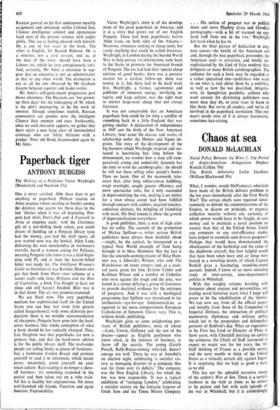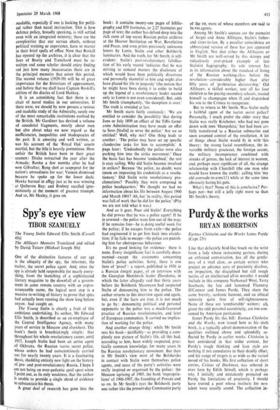Chaos at sea
DONALD McLACHLAN
Naval Policy Between the Wars 1. The. Period of Anglo-American Antagonism Stephen Roskill (Coffins 70s) The British Admiralty Leslie Gardiner (William Blackwood 50s) What, I wonder, would McNamara's whiz-kids have made of the British defence problem in the ten years immediately after the First World War? The service chiefs were required simul- taneously to defend the communications of the Empire, to disarm on principle, to organise collective security without any certainty of which power would have to be fought, to save money and to maintain a naval position no weaker than that of the United States. Could any computer or any cost-efficiency studies have helped to reconcile such diverse purposes? Perhaps they would have .demonstrated the obsolescence of the battleship and the value of the shipborne aircraft; but how helpful would that have been when navy and air force were locked in a wrestling match, of which Captain Roskill gives a fascinating; round-by-round account. Indeed, I know of no more revealing study of inter-service, inter-departmental politics in Whitehall.
With this weighty volume, bristling with footnotes about sources and ,personalities, our leading naval historian starts what I hope will prove to be the rehabilitation of the 'thirties. We can now see, from all the official papers and notably from those of the Committee of Imperial Defence, the interaction of political manoeuvre, diplomacy and' military policy which led to the purposeless and defenceless postures of Baldwin's day. What an experience to be First Sea Lord or Director of Plans in those years, with Churchill ipsisting on cutting the estimates, the Chiefs of Staff instructed to expect no major war for fen years, the Air Staff thinking of France as a possible enemy and the navy unable to think of the United States as a virtually certain ally against Japan. It is surprising that we kept as good a navy as we did.
This has not the splendid narrative sweep of the author's War at Sea. There is a certain tiredness in the, style at times as he strives to be patient and fair with each episode of the war in Whitehall; but it is astonishingly
_aeadable, especially if one is looking for politi- cal rather than naval instruction. This is how defence policy, broadly speaking, is still settled even with an integrated ministry; these are the complexities that our service chiefs, without political training or experience, have to master in their brief spells of office. Now that Roskill has opened up the archives, it is clear that the lives of Beatty and Trenchard must be re- written and some scholar should enjoy finding out just how many inaccuracies there are in the principal memoirs that cover this period. The second volume (1929-39) will be of great importance for the historians of appeasement, and before that we shall have Captain Roskill's edition of the diaries of Lord Hankey.
It is an astonishing fact that there is no chair of naval studies in our universities. If there were, we should by now possess a serious and readable study of the Admiralty, surely one of the most remarkable institutions evolved by the British. Mr Gardiner has devised a volume of anecdotal fragments, mostly about men but also about what we now regard as the inefficiencies, inequalities and inadequacies of the past. It is amusing and well written, as was his account of the `Royal Oak' courts martial, but the title is heavily pretentious. How unfair the British have been to their great • seamen : Drake ostracised the year after the Armada; Rooke a few months after he had won Gibraltar; Byng shot as scapegoat for the nation's unreadiness for war; Vernon dismissed because he spoke up for the lower deck; Hawke burned in effigy just as he was winning ' • at Quiberon Bay; and Rodney recalled igno- miniously at the moment of greatest triumph. And so, Mr Healey, it goes on.







































 Previous page
Previous page